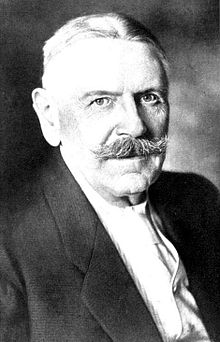Adolf Krazer
Adolf Krazer (born April 15, 1858 in Zusmarshausen ; † August 7, 1926 in Karlsruhe ) was a German mathematician and university professor.
Life
Krazer was the son of a notary. In Dillingen on the Danube , he attended the later Johann Michael Sailer Gymnasium . After graduating from high school, he studied at the Kaiser Wilhelms University of Strasbourg . In 1877 he became active in the Corps Rhenania Strasbourg . In 1878 he was one of the founders of Suevia Strasbourg . He was active for a further three semesters with the third Strasbourg Corps. (among others with Theodor Reye and Elwin Bruno Christoffel ) mathematics, astronomy and physics, 1878/79 in Leipzig (among others with the astronomer Karl Christian Bruhns ) and from 1879 in Würzburg with Friedrich Prym , a student of Bernhard Riemann , where he received his doctorate in 1881 (“Theory of the doubly infinite series of theta based on the Riemann theta formula”) and with whom he worked on the theory of theta functions (only part of a joint book project appeared in 1882). He then studied in Berlin with Karl Weierstrass and Leopold Kronecker and in Leipzig with Felix Klein . In 1883 he completed his habilitation in Würzburg, where he became a private lecturer. In 1889 he became a professor in Strasbourg and, after the publication of his book on theta functions, in 1902 at the TH Karlsruhe , where he was twice rector. He also wrote the article Abelian functions (with Wilhelm Wirtinger ) in the Encyclopedia of Mathematical Sciences 1920 and took part in the publication of Leonhard Euler's Opera Omnia (a total of six volumes).
He had been married since 1886 to the widow of the mayor of Würzburg, the court pharmacist's daughter Euphemie von Sippel, who died in 1901.
Honors
- Honorary member of the Corps Rhenania Strasbourg
- Elected to the German Academy of Sciences Leopoldina (1889)
- Associate member of the Heidelberg Academy of Sciences (1909)
Web links
Individual evidence
- ↑ Kösener Corpslisten 1930, 102/51; 103/2
- ^ Gabriele Dörflinger: Mathematics in the Heidelberg Academy of Sciences . 2014, pp. 42–43.
| personal data | |
|---|---|
| SURNAME | Krazer, Adolf |
| BRIEF DESCRIPTION | German mathematician |
| DATE OF BIRTH | April 15, 1858 |
| PLACE OF BIRTH | Zusmarshausen , Kingdom of Bavaria |
| DATE OF DEATH | August 7, 1926 |
| Place of death | Karlsruhe , Free State of Baden , Weimar Republic |
